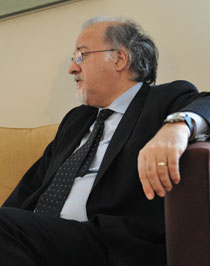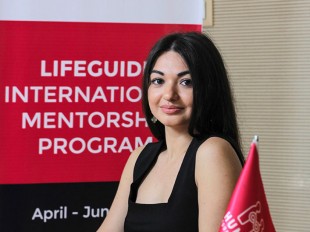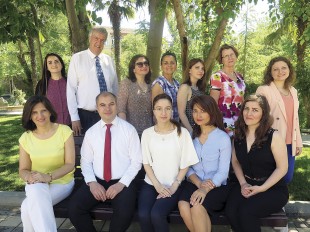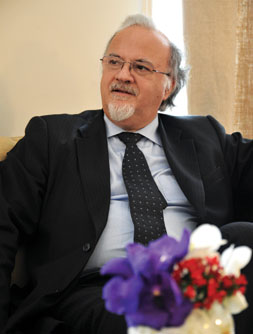 The French embassy is located in the centre of Baku, as France itself is at the heart of Europe. Our lunch with the ambassador was in a truly French setting – exquisite and refined. The table decorations, meal and, of course, excellent French wine, were spiced with Ambassador Pascal Meunier’s subtle humour and the pointed jokes of Yves Zoberman, director of the Institut français in Azerbaijan and counsellor for cooperation and cultural action. It all made for a relaxed, open atmosphere. We talked about everything, from politics to fashion.
The French embassy is located in the centre of Baku, as France itself is at the heart of Europe. Our lunch with the ambassador was in a truly French setting – exquisite and refined. The table decorations, meal and, of course, excellent French wine, were spiced with Ambassador Pascal Meunier’s subtle humour and the pointed jokes of Yves Zoberman, director of the Institut français in Azerbaijan and counsellor for cooperation and cultural action. It all made for a relaxed, open atmosphere. We talked about everything, from politics to fashion. We would like to begin our interview with talk of holidays, since it is already spring. Do you have a favourite holiday here in Azerbaijan?
Well, a holiday here for me is an opportunity to travel around Azerbaijan. My first trip was to the mountainous region – Sheki, Ismayilli, Qabala. I was impressed by their beauty, history and landscapes. I remember that first night in Ismayilli, which I spent in the mountain village of Lahij. Gorgeous, an amazing place. I should say that Azerbaijan has huge potential for tourism, but language problems and lack of information about the Azerbaijani regions make it not so easy for tourists to discover the country. But we are thinking of developing tailor-made specific tours for tourists looking for unusual places. We have already contacted some French tour operators to get the tours started.
France is known as a destination for millions of tourists every year. Now Azerbaijan is trying to attract more travellers from around the world. What would you recommend Azerbaijan do to develop tourism?
There are some steps that I think could help. First of all, visa facilitation. We have to meet the Azerbaijani Ministry of Foreign Affairs and discuss making it easier for French people to get a visa to travel to Azerbaijan. I think there is no political obstacle and all the administrative issues can be resolved soon. I mention this because the issuing of visas is very important for tourism. I’ve heard from French people who visited Azerbaijan years ago that it was very easy to get an Azerbaijani visa then, directly at the airport. Now the situation has changed and it is complicated to apply for a visa. I would also like to recommend improving knowledge of Azerbaijan. There are several ways to do this. The most effective one is to make promotional videos and films about the country. Several months ago Gérard Depardieu was invited to Baku and was involved in a promotional video that will soon be broadcast on French and European TV channels.
Are you satisfied with the level of knowledge about France among Azerbaijani people?
I think there is a lack of information both in Azerbaijan about France and in France about Azerbaijan, although they are both interested in each other. It’s very positive that the First Lady of Azerbaijan, Mrs Mehriban Aliyeva, devotes a lot of attention to Azerbaijani-French cooperation. In fact, she heads many visits organized by the Heydar Aliyev Foundation to French cities. During the visits, programmes are organized to present Azerbaijani culture, music and history. Moreover, the new facilities of the cultural section of the Azerbaijani Embassy in Paris, which was inaugurated during President Aliyev’s visit to France last September, will contribute to a better knowledge of the rich Azerbaijani culture in France.
For our part, we invited a couple of journalists from Azerbaijan to visit France, actually by chance at the same time as President Ilham Aliyev made his visit to Paris in September. I have to say that after their visits they came back with another view and vision of France. The fact that we have about half a million people of Armenian origin living in France doesn’t mean that France disregards Azerbaijanis’ feelings. It is just that French people don’t know much about Azerbaijan. So I think it’s very important to open communications.
The fact that TEAS has opened an office in Paris gives more opportunities to do this successfully. The recent International Symposium on the Holocaust in Baku, which was organized by TEAS jointly with the well-known French-based organization Yahad-In Unum, was one such opportunity. Yahad-In Unum is looking for testimonies from survivors of the Holocaust; they were happy to meet people from the Jewish community in Baku and Guba region. And the fact that France and Azerbaijan are both strongly secular countries plays a very positive role for the image of Azerbaijan.
During Nicolas Sarkozy’s presidency, a law was about to be adopted on criminalizing denial of the ‘Armenian genocide’. This prompted a negative reaction in Azerbaijani society towards France and raised the question of why the Khojaly tragedy is not also given attention. What do you think about the prospects of criminalizing denial of the ‘Armenian genocide’ in the context of Azerbaijani-French cooperation?
I do understand that it is a sensitive issue for Azerbaijan. But I have some comments on that. First of all, I consider that all three countries – Turkey, Armenia and Azerbaijan – need reconciliation and cooperation. I think it’s time to begin reconciliation. Reconciliation does not mean to forget. It means looking together for a better future for our children.
Secondly, the suffering has been hard for Azerbaijan because of a million refugees and IDPs. Both sides are suffering from the conflict. And today it’s a very difficult issue. But France as a co-chair of the Minsk Group with the other co-chairs from Russia and the USA makes every effort to promote constructive dialogue between both sides. We don’t see any other way besides a peaceful solution and continuing negotiations. In my opinion, economic cooperation in the South Caucasus region could speed up a resolution of the conflict.
Talking about the Armenian genocide is always a complicated issue. In France, since 2001, we have a law that recognizes the Armenian genocide. Last January, our parliament adopted a law criminalizing the denial of this genocide and other genocides recognized by France. This law was then invalidated by the Constitutional Court that considered it to be against freedom of speech. Before going further, this matter now needs to be thought about. I think that French people have different opinions on the issue and they can express them. It is part of democracy and freedom of expression. At the moment, French and Turkish relations are appeased. Our relations with Azerbaijan are also meant to develop in the friendly atmosphere that has always been typical of them.
What about the national interests of France? Would criminalization be in the country’s interests?
As I just said, France is a country that welcomes a lot of different communities; it’s a country of freedom of expression. The French government never tried to upset Turkey or any other country. In this particular case, it is more a matter of judicial aspects than national interests.
In a democracy, everybody has the right to express their views. Then there is a vote and a decision.
France was seen as an EU country that used to prevent Turkey from being part of the European family and the main reason given was the religious factor. What do you think are the chances of Azerbaijan, also a Muslim-dominated country, becoming a member of the EU one day?
You know, there is currently a big debate on the path the EU should take over the next few years, which cannot be reduced to a simple question of religion. There are two traditional visions in the EU today. One, which you can call the free-market vision, mainly defines the EU as a large open market. But there is also a different vision of the EU which has been promoted by France and other countries and which gives more importance to the political dimension of European integration. This vision is being implemented gradually and aims at creating an ever closer political union. One day, why not have the United States of Europe? You have to keep in mind these two visions when you look at the whole enlargement policy of the EU: in many EU member states, people with a political vision of the EU say that if we enlarge too much then it will be difficult to prevent dysfunctions within the European institutions and to transform the area into a real political union. This is the reason why France has always supported strong conditionality in each accession process.
The question of Turkey becoming a member of the EU takes place in this wider debate, even if it raises an important number of specific issues, one of which is, for instance, the difficult relationship to Cyprus. Even if it is not the only member state to do so, it’s a fact that France has been blocking a few EU negotiating chapters with Turkey since 2007. But this isn’t linked to religion and we are now trying to figure out what can be done to unlock the situation and, if Turkey respects its obligation towards the EU and each of its member states, to create a new momentum in the accession talks. If the accession negotiations finally come to a successful end, the question of Turkey joining the EU will then be asked of European populations. We cannot rule out that religion could play a role at that time, but it’s too early to launch this debate.
Azerbaijan is not in the same situation as Turkey which was granted the status of an EU candidate country in 1999. Nevertheless, it should not prevent us from strengthening the partnership between Azerbaijan and the EU to better reflect its specificity and important economic position, in the framework of the Eastern Partnership. The EU has special instruments to provide a third country with an appropriate status, reflecting how close that country is to the EU in terms of rules and values. Right now the EU proposal is to negotiate and conclude an association agreement with Azerbaijan.
When building a partnership with an organization, you get both rights and obligations. You cannot take only the rights without the obligations. And this is something that the EU is promoting in its relationship with Azerbaijan. I mean political reforms and democracy. But we have to do it with empathy and without arrogance. Look at France that has been regarded as a country of human rights and democracy since the Revolution of 1789. If we take that as the beginning of a new era, we have to recognize that after the Revolution, we had two empires. So democracy has come a long way with ups and downs. It is not an easy way but it is generally considered the least bad system of governing a country. That is the reason why the EU as well as the US is pushing Azerbaijan to take the path of democracy and find its own way.
Without doubt Azerbaijan considers France to be a very important country which can be seen by the number of official visits the president has made to Paris. Is there anything missing in cooperation between the two countries beyond political issues? We are thinking of the economic, social and cultural spheres.
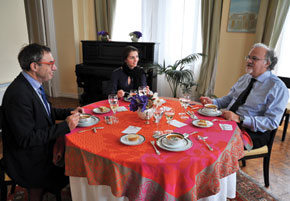 Yves Zoberman, director of the Institut Français in Azerbaijan, Jeyran Bayramova and H.E. Pascal Meunier
Yves Zoberman, director of the Institut Français in Azerbaijan, Jeyran Bayramova and H.E. Pascal MeunierThere is a strategic link between Europe and Azerbaijan which covers broad questions of energy security and society. So France has a key role in this cooperation as well. Besides, both countries have economic contributions; France imports oil products from Baku to the value of 4 billion euros. But our exports are very low, not quite 135 million euros. So what we should do is increase our exports by being better represented in Azerbaijan in transport, IT technology, industry and construction. We have seen the policy of diversification of the economy and there are many opportunities for France to cooperate. We are trying to encourage French companies to come to Azerbaijan to create some successful business stories. For example, Baku’s metro construction is an area to which French companies can contribute. In general, I’m quite optimistic and I am sure that in a couple of years turnover between the two countries will expand. It is pleasing that a Business Forum was held in Paris in March, while the next session of the Azerbaijani-French joint commission on economic cooperation will be held this year. Both events involve medium-sized as well as large companies from various sectors beginning with agriculture and dairy farming, where there is a strong demand on the Azerbaijani side. But we want more Azerbaijani companies working with France to be represented at this forum as well. Fruitful cooperation is never a one-way street.
Is there any movement in the fashion industry? People in Azerbaijan, as in France, are fond of good clothes. How do you find the fashion trends in Baku?
If you walk through Baku you certainly meet elegant, well-dressed women. No wonder, there are fashion shops at every turn, from famous Italian and French brands. I think that in parallel with the fashion industry we can cooperate in luxury products including perfumes, wine, cognac and champagne. This is an area in which we should do more in Azerbaijan; the country has already been recognized as a top consumer of French beauty and luxury products.
The French are usually associated with good manners, refined taste and love. What kind of associations do Azerbaijanis have for you?
The first association that comes to my mind is hospitality, and I would say spontaneous hospitality. Azerbaijanis are very warm and kind people who respect their traditions. When I travelled to the regions I was surprised how people met us, welcomed and invited us for a cup of tea in a warm atmosphere. At the same time individualism is very highly developed among Azerbaijani people.
Do the French and Azerbaijanis have anything in common?
Indeed, it’s a great love of good food! (Smiling.)You know there is an interesting observation. Before coming to Baku foreigners imagine Azerbaijan to be a different country. But after they arrive they change their opinion completely; they feel at home. And there is no anti-western feeling! So I think western people like me feel very good in Baku.
What three things made in Azerbaijan would you like to take back with you to France?
I would like to take something from the field of art. It could be a painting, sculpture or carpet. To tell the truth, I was very impressed by the quality of artists’ work here in Azerbaijan. I really like the work of one of my best friends, Tahir Salahov, who is a famous artist. I would also like to keep impressions from the national music of mugham and jazz. And the third thing… hmm… maybe your special jam. I really like its taste and the way you eat it as an accompaniment to armudu (pear-shaped) glasses of tea. It could be good business to take Azerbaijani jam to the French market, why not?
